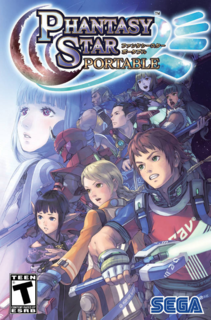In spite of some drawbacks, Phantasy Star Portable is a wonderful PSU experience that can now be enjoyed anywhere.
The story transpires after the events of PSU and before those of Ambition of Illuminus. At the start, you will create your very own avatar using a myriad of customization options. The difference here in Portable is that you'll begin the game with a fully-developed Partner Machine; even going so far as deciding which form it will take. After you've created your character, you'll have the option of playing the offline Story Mode, or Wi-fi Multiplayer for when you've got some buddies to play with. The Story Mode will introduce a new character named Vivienne, a newly-created prototype Cast who will essentially become your interim partner during Story-based Missions. The interesting thing about Vivienne is that she's very much like a newborn infant just getting to know the ways of the Gurhal System, its people, its ideologies, and so forth. Often at times, she comes across as naive (and rightfully so, seeing how she is a robot and all) but will not hesitate to voice her opinions when necessary. This is where you, the fresh Guardian recruit, come in. You'll often be asked to choose one of two textual responses during specific points in fully-voiced (and decently acted) cutscenes. It goes without saying that the choices you make will ultimately determine the ending of the game and Vivienne's overall perspective on how she perceives the world and the people living in it. Of course, you'll also run into familiar faces and heroes of the PSU saga--like Karen Erra, Laia Martinez, Lou; even Ethan Waber.
One thing you needn't school Vivienne in is the art of combat--she seems to have inherently mastered that aspect to a frightening fault. The combat in Portable is just as you remember it from the PSU days--simple, straightforward and not overly complex. You'll use a variety of weapons and Photon Arts, collect weapons and build your Avatar as usual--performing a variety of Free Missions to harvest your strength and get necessary items (drops). New to Portable is the inclusion of an Achievement system, which allows you to earn titles and rewards for satisfying various conditions like killing a certain number of monsters, reaching levels, completing missions and earning a certain amount of money. These Achievements are mostly concerned with how much time you invest into the game rather than measuring your variable area of gaming skills.
Exploring cities has been scaled down into textual menu navigation and simplified maps; negating the freedom of walking around and taking in the sights at your leisure. While this certainly makes things much more convenient, it compromises the open-ended charm I enjoyed when I played the original console game. The Multiplayer option for Portable is hurt in this way because part of what made PSU online so great is hanging out in towns and chatting with other players inbetween missions and runs. Player chat bubbles, emotes and character animations have also been removed from this release, which is disappointing when you're playing Multiplayer because your characters don't have that unique personality anymore. Also, you cannot decorate your room as you could in PSU--a feature that was also one of the more appealing draws of the game. And as nice as it is having a fully-developed Partner Machine ready at the outset without the need of feeding it items, the ability to craft and build your own weapons is no longer an option. In spite of these disheartening omissions, at least when you're playing ad-hoc with friends, you're not paying $15 a month.
On the flip side, upgrading weapons you've found or bought in shops are no longer a risky affair, meaning you don't ever have to worry about your weapon breaking when you're getting it fine-tuned at the Upgrade shops. The small-fry items that allow you to do just that are awarded fairly frequently, so building up your weapons is easier on your anxiety tolerance and can actually be a lot of fun. Photon Arts are also relatively easier to level up, and when you invite characters to join you in Free Missions and Story-based Campaigns, you will even receive bonuses on Meseta and Item drops, among other things.
The graphics hold true to the original game, and faithfully replicate the PSU world in almost every sense of the term--albeit some draw-in and clipping issues, but they're hardly noticeable enough to detract from the experience. Character models are done reasonably well, and the music is as you remember it from the console game with some new tunes thrown in for good measure. Voice-acting during cutscenes is tolerable in a sense--not great, but not horrible either. There's no option to shut it off or skip the cutscene outright--you can skip over the dialogue in short spurts. Vivienne isn't so annoying as she is incredibly observant of situations and opinionated of others, so if you can tolerate how she perceives the world in which was newly built, you'll be fine.
Overall, Phantasy Star Portable is a fine package for those who loved PSU and want some of that experience on a roadtrip or just away from the dregs of a computer screen. While a lot of the more charming elements from PSU are no longer available, it is still a fun experience that I can heartilly recommend to PSU veterans or anyone looking for a good action-RPG for their PSP library.

